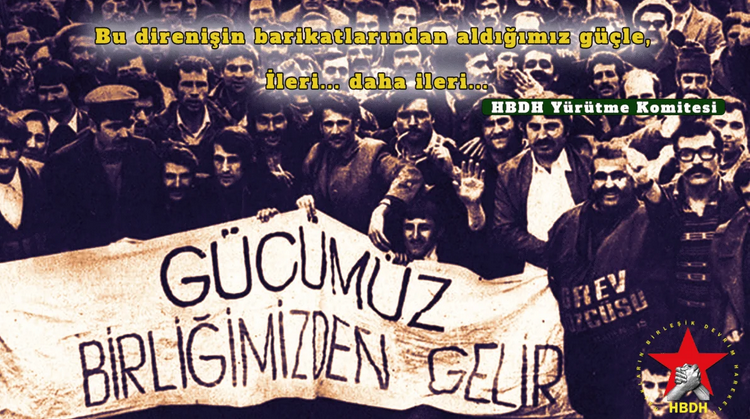
“Tens of thousands of workers, men and women, charged the barricade. The barricade was torn apart like a piece of paper. The wave of workers that had been billowing for a moment, poured out like lightning and they all roared in unison: FORWARD!” Because the loud voice of resistance had found its echo; “There is no more old workers, there is the working class!” This is how the Great Workers’ Resistance of June 15-16 was described in the revolutionary publications of that period.
The workers’ resistance and strikes that grew wave by wave in the face of the intense attacks of the capitalists of the period against workers and laborers reached their peak on June 15-16, 1970, and turned into a force that shook the ruling classes from top to bottom. Because after this resistance in which the working class displayed its power derived from production, the capitalist state was forced to declare martial law. The June 15-16 resistance is the name of the class solidarity and development of class consciousness of the workers against the state power of the period, which attempted to enact laws in line with the wishes of the capitalists, usurped the union freedoms of the workers and condemned them to collaborative unionism. The workers stood together in the squares and strikes, saying “This is not a union cause, this is a workers’ cause” and made the streets of Istanbul and Izmit narrow to the TC state forces and the servants of the capital class. Workers in all production areas, large and small, flocked to the streets.
The June 15-16 resistance was the day when the working class woke up and made the bloodsucking capital segments tremble despite all state resources and attacks. Of course, the igniting cartridge of that day was the usurpation of the right of the working class to organize and the freedom to establish a union. However, this resistance was not limited to this, it affected all segments of the people, united with the demands and desires of the peasants and other oppressed layers of the people, and became the language of the poverty of the period.
In the face of the increasing struggle of the working class, the capitalists suppressed the resistances with blood in the short term, and in the long term, they tried to block the organized struggle of the class with all their ideological, political and military tools. To this end, martial law and coup mechanisms were used against all organized segments of the class, especially the revolutionary forces. Paramilitary forces were raised in places where the state’s repressive apparatus was insufficient, and state terror was unleashed against all segments of the oppressed people, especially the working class.
The aim was to cut down the minor rights and freedoms gained after 1960 and to suppress the awakening of the class. Despite the passing of 55 years, the struggle of the working class, the oppressed laborers and the broad masses of the people continues. Despite all the fascist coups, oppressions at the level of labor war, intense ideological attacks and chauvinism, the resistance of workers, laborers and peasants has not been prevented to this day. The Gezi uprising is the most concrete example of this. The attacks and oppressions against the working class have continued during the periods of AKP governments, which are the most ardent and aggressive representatives of the Turkish bourgeois class.
These oppressions have progressed fundamentally in the form of workplace murders, usurpation of strike rights, usurpation of union organization rights, etc. and have reached higher dimensions today. In line with the needs of the Turkish ruling bourgeoisie, the Turkish state has increased the dimensions of its attacks against the working class, revolutionary-democratic and patriotic segments domestically, while continuing its occupation policies abroad and providing commercial support to genocidal Israel.
Therefore, Turkish capitalists have become partners in the blood shed by imperialism in the Middle East and Africa, and have become the mortal enemy not only of the people of Turkey and Kurdistan, but of the peoples in the entire region. Attacks against the working class cannot be considered solely as AKP policy. In the example of the Izmir Municipality workers, it has become clear once again that the CHP is a party at least as hostile to workers as the AKP. This reality is fixed in the history of the struggle of the working class in Turkey and Kurdistan. Because it is the CHP mentality that massacred workers who went on strike during the single-party period.
The AKP’s failure to achieve this under current conditions is completely related to the developing struggle of the working class. Today, workers in the metal, mining, textile, food, construction, plastic, shipyard and service sectors are carrying out many resistances. These resistances will continue to increase in the coming years because Turkish capitalists want to put the entire burden of the war preparations and the bill for the crisis that the international imperialist system has entered onto the working class. The AKP/MHP, which holds the executive power of the Turkish state, is implementing policies step by step that will further impoverish the people and deepen the attacks on the working class. Therefore, the Turkish Working Class has the potential to carry out greater resistances within itself.